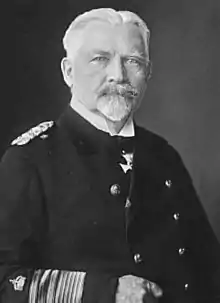Ludwig von Schröder
Ludwig von Schröder (17 July 1854 Hintzenkamp near Eggesin – 23 July 1933 in Berlin-Halensee) was an Imperial German Navy officer and Admiral during the First World War and a recipient of the Pour le Mérite with Oak Leaves.
Ludwig von Schröder | |
|---|---|
 Ludwig von Schröder | |
| Born | 17 July 1854 Hintzenkamp near Eggesin, Kingdom of Prussia |
| Died | 23 July 1933 (aged 79) Berlin-Halensee, Germany |
| Buried | Invalidenfriedhof Berlin |
| Allegiance | |
| Service/ | |
| Years of service | 1871–1918 |
| Rank | Admiral |
| Commands held | Marinekorps Flandern |
| Battles/wars | World War I |
| Awards | Pour le Mérite with Oak Leaves |
| Relations | Ludwig von Schröder (son) |

Biography
Schröder entered the newly organized Imperial Naval Service in May 1871 as cadet after passing his examinations. He was assigned for eight months to the sail training ship SMS Niobe before being posted to Naval School Kiel. After graduation he was initially assigned as subaltern to naval infantry, followed by service on several ships, then as commanding officer of the aviso SMS Blitz, the training vessel SMS Moltke and the cruiser SMS Vineta. With his promotion to admiral in January 1911 he functioned as chief of the Cruiser Division of the West Indies Station. In February 1912 Schröder was elevated to the hereditary Prussian nobility by Kaiser Wilhelm II. Admiral Ludwig von Schröder retired from active duty in 1913. One of his final assignments was commander of Baltic Sea Naval Command.[1]
With the outbreak of war in August 1914, Schröder was recalled to active service and named commanding Admiral in Flanders, placed in charge of both the seagoing forces and the 1st Marine Division. By mid-November 1914 additional naval infantry formations were raised and added to his command to form Marinekorps Flandern. He was in command during the 1916 Battle of Dover Strait, the successful German attack on the Dover Barrage. Schröder’s leadership earned him the sobriquet “Lion of Flanders” in Germany.[2]
After transfer to the Baltic near the end of the war, Schröder was ordered by Wilhelm II to take action against mutineering German sailors at Kiel. The government of Reichskanzler Max von Baden was opposed to these measures and the orders were thus not carried out. Ludwig von Schröder retired a second time on 12 December 1918. He died in Berlin-Halensee on 23 July 1933, age 79, and was buried at the Invalidenfriedhof cemetery, Berlin, with son Joachim (1885-1929) who preceded him in death. Son Ludwig Karl (1884-1941) was a Luftwaffe general during the Second World War.
Awards
- Albert Order
- Iron Cross 1st and 2rd Class
- Pour le Mérite (20 October 1915) with Oak Leaves (23 December 1917)
- Bavarian Military Merit Order
- Order of the Crown
- Order of the Red Eagle
Bibliography
- Hildebrand, Karl-Friedrich; Zweng, Christian (2011). Die Ritter des Ordens Pour le Mérite des I. Weltkriegs [The Knights of the Order Pour le Mérite of World War I]. Vol. Band 3: P–Z. Bissendorf: Biblio Verlag. pp. 451–453. ISBN 3-7648-2586-3.
- Karau, Mark (2003). "Wielding the Dagger": The MarineKorps Flandern and the German War Effort 1914–1918. Contributions in Military Studies. Vol. 226. Westport, Connecticut: Preager. ISBN 0-313-32475-1.
- Möller-Witten, Hanns (1935). Geschichte der Ritter des "Ordens pour le mérite" im Weltkrieg [History of the Knights of the "Order pour le mérite" during the World War]. Vol. Band II: M–Z. Berlin: Verlag Bernard & Graefe. pp. 442–444. OCLC 11108719.
References
- Waldeyer-Hartz, H. Ein Mann: Das Leben des Admirals Ludwig v. Schröder. Wiesbaden: Vieweg+Teubner Verlag (1934), p. 214
- Hamburger Nachrichten, 24 July 1933. Obituary Admiral Ludwig von Schröder
External links
 Media related to Ludwig von Schröder at Wikimedia Commons
Media related to Ludwig von Schröder at Wikimedia Commons- Newspaper clippings about Ludwig von Schröder in the 20th Century Press Archives of the ZBW